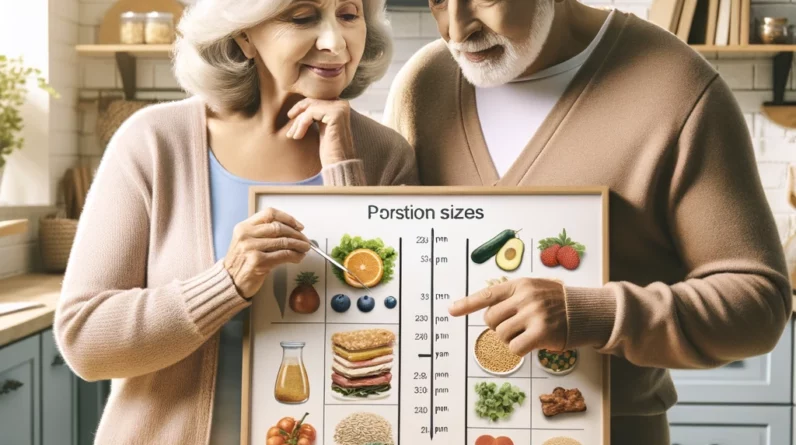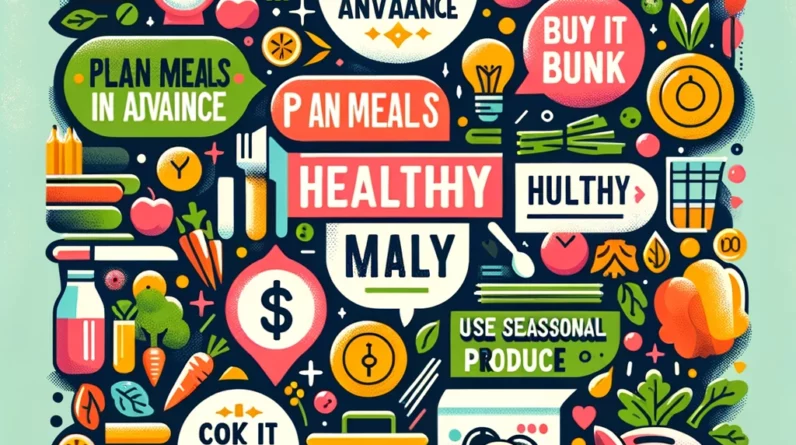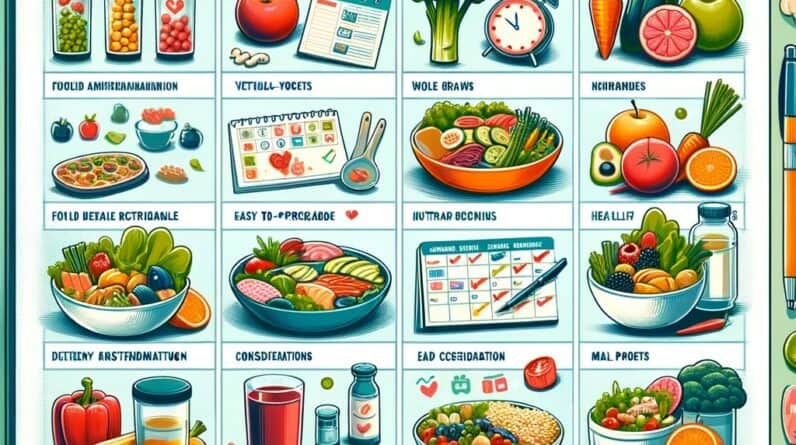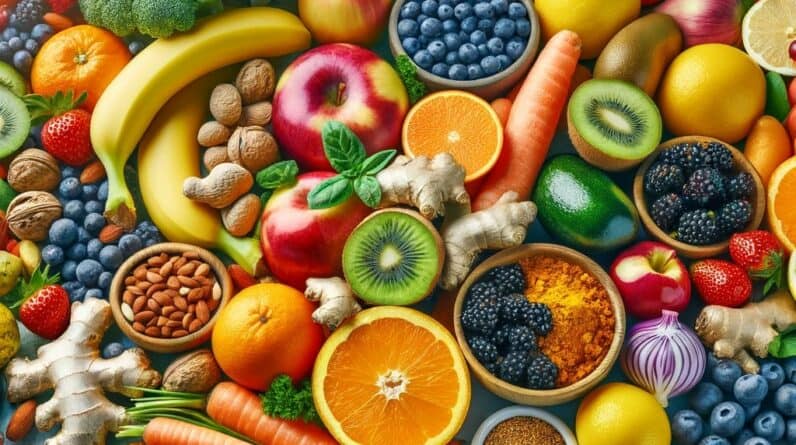
Dementia Discovery That is Leaving Doctors Speechless (Try This Tonight)
Better than Morphine For Joint Pain… Yet Safer Than Aspirin?
Retire With Freedom. Start Earning Extra Cash Today.
Introduction
Welcome to our comprehensive guide on the role of vitamins and minerals in senior nutrition. In this article, we will explore the importance of vitamins and minerals for seniors, common deficiencies, recommended daily allowances, and the best food sources.
Additionally, we will discuss the challenges faced by seniors in meeting their nutritional needs and provide practical solutions for improving senior nutrition.
Let’s dive in and uncover the essential information that will support healthy aging and wellness for seniors!
Understanding Vitamins and Minerals for Senior Nutrition
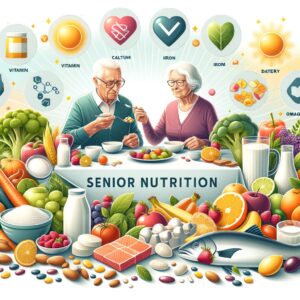
Why Are Vitamins and Minerals Important for Seniors?
Why Are Vitamins and Minerals Important for Seniors?
As we age, our bodies undergo various changes, and maintaining adequate levels of essential vitamins and minerals becomes crucial for overall health and well-being.
Vitamins and minerals play a vital role in supporting bodily functions, immune system health, and energy metabolism.
They also contribute to the maintenance of bone strength, cognitive function, and cardiovascular health in seniors.
Research has shown that the intake of specific vitamins and minerals is associated with a reduced risk of chronic diseases that are more prevalent in older adults.
For example, vitamin D has been linked to a decreased risk of osteoporosis, while vitamin B12 is important for neurological function.
Similarly, minerals like calcium and magnesium are essential for bone health and muscle function in seniors.
As we age, our bodies become less efficient at absorbing nutrients from food.
This can lead to deficiencies in essential vitamins and minerals, making it even more important for seniors to pay attention to their nutrient intake.
Here are some of the key roles that vitamins and minerals play in aging well:
- Vitamin D: This vitamin is essential for maintaining strong bones and preventing osteoporosis. It also plays a role in immune system function and may help reduce the risk of certain chronic diseases.
- Calcium: Along with vitamin D, calcium is crucial for maintaining bone health and preventing osteoporosis. It also plays a role in muscle and nerve function.
- Vitamin B12: This vitamin is important for neurological function and can help prevent age-related cognitive decline.
- Magnesium and Potassium: These minerals are essential for muscle and nerve function, as well as maintaining healthy blood pressure levels.
Unfortunately, many seniors are deficient in these and other essential vitamins and minerals.
This can be due to a variety of factors, including changes in diet, decreased absorption, and certain medications that can interfere with nutrient absorption.
Here are some of the most common vitamin and mineral deficiencies in seniors:
- Vitamin D Deficiency: This is one of the most common deficiencies in seniors, as our bodies become less efficient at producing vitamin D from sunlight as we age. This deficiency can lead to weakened bones and an increased risk of osteoporosis.
- Calcium Deficiency: As mentioned, calcium is crucial for maintaining strong bones. A deficiency in this mineral can lead to osteoporosis and an increased risk of fractures.
- Vitamin B12 Deficiency: This deficiency is more common in seniors due to decreased absorption in the stomach. It can lead to neurological issues, such as memory loss and difficulty with balance and coordination.
- Deficiency of Magnesium and Potassium: These minerals are important for maintaining healthy blood pressure levels and preventing muscle cramps and weakness. Seniors may be at a higher risk for deficiencies in these minerals due to changes in diet and decreased absorption.
To ensure that seniors are getting the necessary vitamins and minerals, it is important to understand the recommended daily allowance (RDA) for each nutrient.
The RDA is the amount of a nutrient that is considered sufficient to meet the needs of most healthy individuals.
However, seniors may have different nutrient needs due to changes in absorption and metabolism.
Here is a breakdown of the RDA for some key vitamins and minerals for seniors:
- Vitamin D: 800-1000 IU per day
- Calcium: 1200 mg per day
- Vitamin B12: 2.4 mcg per day
- Magnesium: 320-420 mg per day
- Potassium: 4700 mg per day
It is important to note that these recommendations may vary depending on individual health needs and any underlying medical conditions.
It is always best to consult with a healthcare professional to determine the appropriate nutrient intake for each individual.
One of the best ways for seniors to get the necessary vitamins and minerals is through a well-balanced diet. Here are some of the best food sources for essential nutrients:
- Fruits and Vegetables High in Vitamins and Minerals: Fruits and vegetables are packed with essential vitamins and minerals, making them an important part of a senior’s diet. Some of the best options include leafy greens, berries, citrus fruits, and cruciferous vegetables like broccoli and cauliflower.
- Nuts, Seeds, and Whole Grains as Nutrient-Rich Foods: These foods are not only a great source of essential vitamins and minerals, but they also provide healthy fats and fiber. Some good options for seniors include almonds, chia seeds, and quinoa.
- Importance of Lean Proteins for Essential Minerals: Lean proteins like chicken, fish, and tofu are not only important for muscle health, but they also provide essential minerals like magnesium and potassium.
In conclusion, vitamins and minerals are crucial for seniors to maintain overall health and well-being.
By understanding the impact of aging on nutrient absorption, common deficiencies in seniors, and the recommended daily allowance for essential vitamins and minerals, seniors can make informed decisions about their diet and ensure they are getting the necessary nutrients for healthy aging.
Common Vitamin and Mineral Deficiencies in Seniors
As we age, our bodies undergo various changes that can affect our nutrient intake and absorption.
This can lead to deficiencies in essential vitamins and minerals, which can have a significant impact on our overall health and well-being.
In this section, we will discuss the most common deficiencies among seniors and how they can be addressed.
Vitamin D is essential for maintaining strong bones and teeth, as well as supporting immune function and regulating mood.
Unfortunately, many seniors are deficient in this important vitamin due to reduced sun exposure, which is necessary for the body to produce vitamin D.
This deficiency can lead to an increased risk of fractures, muscle weakness, and even depression.
To combat vitamin D deficiency, seniors can increase their sun exposure or take a vitamin D supplement.
Foods high in vitamin D include fatty fish, egg yolks, and fortified dairy products.
Calcium is another crucial nutrient for maintaining strong bones and teeth, as well as supporting muscle and nerve function.
As we age, our bodies become less efficient at absorbing calcium, which can lead to deficiencies. This deficiency can increase the risk of osteoporosis and fractures.
To prevent calcium deficiency, seniors should consume calcium-rich foods such as dairy products, leafy greens, and fortified cereals.
Calcium supplements may also be recommended by a healthcare provider.
Vitamin B12 is important for maintaining healthy nerve cells and red blood cells, as well as supporting brain function.
Seniors are at a higher risk of B12 deficiency due to reduced stomach acid production, which is necessary for the absorption of this vitamin. Deficiency can lead to fatigue, weakness, and cognitive impairment.
To address B12 deficiency, seniors can consume foods high in this vitamin such as meat, fish, eggs, and fortified cereals.
B12 supplements may also be recommended by a healthcare provider.
Magnesium and potassium are essential minerals for maintaining healthy blood pressure, nerve and muscle function, and bone health.
Seniors may experience deficiencies in these minerals due to reduced intake or impaired absorption. This can lead to muscle cramps, weakness, and irregular heart rhythms.
To increase magnesium and potassium intake, seniors can consume foods such as leafy greens, nuts, seeds, and whole grains.
Supplements may also be recommended by a healthcare provider.
Understanding the recommended daily allowance (RDA) of vitamins and minerals is crucial for seniors to ensure they are meeting their nutrient needs.
The RDA is the average daily intake level that is sufficient to meet the nutrient requirements of most healthy individuals.
The RDA takes into account age, gender, and other factors that may affect nutrient needs. Seniors need to meet the RDA to prevent deficiencies and maintain optimal health.
The RDA for vitamins and minerals may vary for seniors compared to younger adults. For example, the RDA for calcium increases from 1000mg to 1200mg for adults over 70 years old.
Seniors need to consult with a healthcare provider to determine their specific nutrient needs.
In addition to supplementation, seniors can also meet their nutrient needs through a well-balanced diet. Here are some of the best food sources of vitamins and minerals for seniors:
Fruits and vegetables are packed with essential vitamins and minerals, making them an important part of a senior’s diet.
Some examples include leafy greens, berries, citrus fruits, and cruciferous vegetables.
Nuts, seeds, and whole grains are excellent sources of vitamins and minerals, as well as fiber and healthy fats.
Seniors can incorporate these foods into their diet through snacks or as part of meals.
Lean proteins such as fish, poultry, and beans are not only important for muscle and bone health, but they also provide essential minerals such as iron and zinc.
Seniors should aim to include a source of lean protein in each meal.
In conclusion, seniors should be aware of the potential deficiencies in essential vitamins and minerals and take proactive steps to address them through dietary modifications and, if necessary, supplementation.
Consultation with a healthcare provider is recommended to determine specific nutrient needs and ensure optimal health and well-being in the senior years.
Recommended Daily Allowance of Vitamins and Minerals for Seniors
The recommended daily allowance (RDA) of vitamins and minerals for seniors is based on scientific guidelines that aim to meet the nutritional needs of older adults.
The RDA takes into consideration factors such as age, gender, and specific health conditions.
Meeting the RDA for vitamins and minerals ensures that seniors maintain optimal health and reduce the risk of nutrient deficiencies.
Seniors are encouraged to consult with healthcare professionals to determine their RDA for vitamins and minerals, as it can vary depending on individual health status and dietary habits.
It is important to note that the RDA is not a one-size-fits-all recommendation, and may need to be adjusted for certain individuals.
Here are some key points to keep in mind when it comes to the RDA of vitamins and minerals for seniors:
- The RDA is based on the average daily intake that is needed to meet the nutrient requirements of 97-98% of healthy individuals in a specific age and gender group.
- The RDA is not a minimum requirement, but rather a recommended amount to maintain good health and prevent deficiencies.
- The RDA may vary depending on individual factors such as age, gender, and health conditions.
- The RDA for seniors is typically higher than that of younger adults due to changes in nutrient absorption and metabolism that occur with aging.
Now, let’s take a closer look at the specific RDA for different vitamins and minerals that are essential for senior nutrition:
The RDA for vitamin A for seniors is 900 micrograms (mcg) for men and 700 mcg for women. This vitamin is important for maintaining healthy vision, immune function, and skin health.
The RDA for vitamin C for seniors is 90 mg for men and 75 mg for women. This vitamin is a powerful antioxidant that helps boost immune function and promote healthy skin, bones, and teeth.
The RDA for vitamin D for seniors is 600 international units (IU) for both men and women.
This vitamin is crucial for maintaining strong bones and muscles, as well as supporting immune function and reducing the risk of chronic diseases.
The RDA for vitamin E for seniors is 15 mg for both men and women. This vitamin is a powerful antioxidant that helps protect cells from damage and supports immune function.
The RDA for vitamin K for seniors is 120 mcg for men and 90 mcg for women. This vitamin is important for blood clotting and bone health.
The RDA for calcium for seniors is 1200 mg for both men and women. This mineral is essential for maintaining strong bones and teeth, as well as supporting nerve and muscle function.
The RDA for magnesium for seniors is 420 mg for men and 320 mg for women. This mineral is involved in over 300 biochemical reactions in the body and is important for maintaining healthy bones, muscles, and heart function.
The RDA for potassium for seniors is 4700 mg for both men and women. This mineral plays a key role in regulating blood pressure and maintaining heart health.
The RDA for iron for seniors is 8 mg for men and 18 mg for women. This mineral is important for producing red blood cells and preventing anemia.
The RDA for zinc for seniors is 11 mg for men and 8 mg for women. This mineral is essential for immune function, wound healing, and maintaining healthy skin and vision.
The RDA for selenium for seniors is 55 mcg for both men and women. This mineral is a powerful antioxidant that helps protect cells from damage and supports immune function.
While supplements can help meet the RDA for vitamins and minerals, it is always best to get these nutrients from whole foods.
Here are some nutrient-rich foods that seniors should include in their diet:
Fruits and Vegetables High in Vitamins and Minerals
- Dark leafy greens such as spinach, kale, and collard greens are rich in vitamins A, C, and K, as well as calcium, magnesium, and potassium.
- Colorful fruits like berries, oranges, and kiwi are packed with vitamin C and other antioxidants.
- Cruciferous vegetables like broccoli, cauliflower, and Brussels sprouts are high in vitamins C and K, as well as folate and other important nutrients.
Nuts, Seeds, and Whole Grains as Nutrient-Rich Foods
- Nuts and seeds like almonds, walnuts, and chia seeds are excellent sources of vitamin E, magnesium, and other essential minerals.
- Whole grains like quinoa, brown rice, and whole wheat are rich in B vitamins, iron, and other important nutrients.
Importance of Lean Proteins for Essential Minerals
Lean proteins such as chicken, fish, and tofu are not only important for muscle maintenance and repair, but also for providing essential minerals like iron, zinc, and selenium.
In conclusion, meeting the recommended daily allowance of vitamins and minerals is crucial for seniors to maintain optimal health and prevent nutrient deficiencies.
By incorporating a variety of nutrient-rich foods into their diet, seniors can easily meet their RDA and support their overall well-being.
Best Food Sources of Vitamins and Minerals for Seniors
Obtaining essential vitamins and minerals through a balanced diet is the cornerstone of senior nutrition.
As we age, our bodies become less efficient at absorbing nutrients, making it even more important for seniors to include a variety of nutrient-rich foods in their daily meals.
These foods provide a diverse array of essential nutrients that support overall health and vitality in older adults.
Fruits and vegetables are excellent sources of vitamins and minerals for seniors.
They are low in calories and high in fiber, making them a great addition to any senior’s diet. Some of the best fruits and vegetables for seniors include:
- Leafy green vegetables such as spinach, kale, and collard greens are rich in vitamins A, C, and K, as well as calcium and magnesium.
- Berries, such as blueberries, strawberries, and raspberries, are packed with antioxidants and vitamins C and K.
- Citrus fruits, like oranges, grapefruits, and lemons, are high in vitamin C and folate.
- Tomatoes are a good source of vitamins A and C, as well as potassium.
- Squash, sweet potatoes, and carrots are rich in beta-carotene, which the body converts to vitamin A.
Nuts, seeds, and whole grains are also excellent sources of vitamins and minerals for seniors.
They are high in fiber, healthy fats, and essential nutrients. Some of the best options for seniors include:
- Almonds, cashews, and walnuts are rich in vitamin E, magnesium, and potassium.
- Sunflower seeds and pumpkin seeds are high in zinc, iron, and magnesium.
- Whole grains, such as oats, quinoa, and brown rice, are packed with B vitamins, iron, and magnesium.
- Fortified cereals and breads are good sources of B vitamins, including folic acid.
Lean proteins are essential for seniors to maintain muscle mass and strength, as well as to support bone health. Some of the best sources of lean protein for seniors include:
- Fish, such as salmon, tuna, and sardines, are rich in omega-3 fatty acids, which are important for heart health.
- Skinless chicken and turkey are good sources of lean protein, as well as B vitamins and iron.
- Beans and legumes, such as lentils, chickpeas, and black beans, are high in protein, fiber, and essential minerals like iron and potassium.
- Tofu and other soy products are good sources of protein and calcium, which is important for bone health.
Incorporating a variety of these nutrient-rich foods into a senior’s diet can help ensure they are getting the vitamins and minerals they need to stay healthy and active.
It is also important for seniors to consult with their healthcare provider or a registered dietitian to determine their specific nutrient needs and any necessary supplements.
Challenges and Solutions for Senior Nutrition
Challenges Faced by Seniors in Meeting Nutritional Needs
Meeting nutritional needs can be challenging for seniors due to various factors such as changes in appetite, decreased metabolic rate, dental issues, and limited financial resources.
Additionally, certain health conditions and medications can affect the absorption and utilization of nutrients, leading to potential deficiencies.
It is important to address these challenges to ensure that seniors maintain adequate nutrition and optimal well-being.
- Changes in Appetite and Digestion: As we age, our appetite and digestion can change, making it difficult to consume enough nutrients. Seniors may experience a decrease in appetite, leading to reduced food intake and potential nutrient deficiencies. This can be caused by a variety of factors such as changes in taste and smell, medication side effects, and underlying health conditions.
- Medical Conditions Affecting Nutrient Intake: Many seniors have chronic health conditions that can affect their ability to meet their nutritional needs. For example, conditions like diabetes, heart disease, and gastrointestinal disorders can impact nutrient absorption and utilization. This can lead to deficiencies in essential vitamins and minerals, which can have negative effects on overall health.
- Limited Mobility and Access to Nutrient-rich Foods: Limited mobility and access to transportation can make it challenging for seniors to purchase and prepare nutrient-rich foods. This can result in a diet that is lacking in essential nutrients, leading to potential deficiencies. Additionally, seniors living in food deserts may have limited access to fresh, healthy foods, making it difficult to maintain a balanced diet.
These challenges can have a significant impact on the health and well-being of seniors.
It is important to address these issues and find solutions to ensure that seniors are meeting their nutritional needs.
Several solutions and strategies can help seniors overcome the challenges they face in meeting their nutritional needs. These include:
- Importance of Medical Supervision and Dietary Counseling: Seniors should consult with their healthcare provider to address any underlying health conditions that may be affecting their ability to meet their nutritional needs. Medical supervision and dietary counseling can help seniors develop a personalized nutrition plan that takes into account their specific health needs and challenges.
- Adapting Meal Plans to Accommodate Nutritional Needs: Seniors may need to make adjustments to their meal plans to ensure they are getting the necessary nutrients. This may include incorporating more nutrient-dense foods, such as fruits, vegetables, whole grains, and lean proteins, into their diet. It may also involve modifying the texture and consistency of foods to accommodate dental issues or difficulty swallowing.
- Community Resources and Support for Seniors: There are many community resources available to help seniors meet their nutritional needs. These include meal delivery programs, food assistance programs, and senior centers that offer nutritious meals and social support. Seniors can also seek out support from family, friends, and caregivers to help with grocery shopping and meal preparation.
By addressing these challenges and implementing these solutions, seniors can improve their nutritional intake and overall health.
Seniors need to prioritize their nutrition and seek out support when needed to ensure they are meeting their dietary needs.
Solutions and Strategies for Improving Senior Nutrition
As we age, our nutritional needs change and it becomes increasingly important to maintain a healthy diet to support our overall health and well-being.
However, many seniors face challenges in meeting their nutritional needs, which can lead to malnutrition and other health issues.
Fortunately, some practical solutions and strategies can help improve senior nutrition.
One of the first steps in improving senior nutrition is seeking medical supervision and dietary counseling.
As we age, our bodies may require different levels of nutrients and it is important to consult with a healthcare professional to determine our individual needs.
A registered dietitian can provide personalized nutrition advice and help create a meal plan that meets our specific dietary requirements.
Additionally, seniors may have underlying medical conditions that affect their nutrient intake.
For example, those with diabetes may need to monitor their carbohydrate intake, while those with heart disease may need to limit their sodium intake.
Medical supervision and dietary counseling can help seniors manage these conditions and ensure they are getting the necessary nutrients to support their health.
Meal planning is an essential part of maintaining a healthy diet, especially for seniors.
However, as we age, our appetites and digestion may change, making it more difficult to meet our nutritional needs through traditional meal planning.
In these cases, it is important to adapt meal plans to accommodate these changes.
For example, seniors may experience a decrease in appetite, making it difficult to consume enough calories and nutrients.
In this case, smaller, more frequent meals may be more manageable. Additionally, incorporating nutrient-dense foods, such as lean proteins, fruits, and vegetables, can help ensure seniors are getting the necessary nutrients in smaller portions.
Seniors may also experience changes in digestion, such as difficulty chewing or swallowing.
In these cases, it may be necessary to modify the texture of foods to make them easier to consume. Pureeing or blending foods can make them easier to swallow, while still providing the necessary nutrients.
Many communities offer resources and support for seniors to help improve their nutrition.
Meals on Wheels, for example, delivers nutritious meals to seniors who may have difficulty preparing their meals.
This not only ensures they are getting the necessary nutrients but also provides social interaction and support.
Other community programs may offer nutrition education, cooking classes, or grocery delivery services to help seniors maintain a healthy diet.
These resources can be especially beneficial for those with limited mobility or access to nutrient-rich foods.
In addition to meal planning and community resources, staying physically active and engaging in social dining experiences can positively impact appetite and overall nutritional intake among older adults.
Regular physical activity can help maintain muscle mass and improve digestion, making it easier to meet nutritional needs.
Social dining experiences, such as eating with friends or participating in group meals, can also improve appetite and overall enjoyment of meals.
This can be especially beneficial for seniors who may live alone or have limited social interaction.
In conclusion, there are many challenges that seniors face in meeting their nutritional needs.
However, by seeking medical supervision and dietary counseling, adapting meal plans, utilizing community resources, and staying physically active and socially engaged, seniors can improve their nutrition and overall health.
Seniors need to prioritize their nutrition and make use of these practical solutions and strategies to support their well-being in their golden years.
Conclusion
In conclusion, the role of vitamins and minerals in senior nutrition is paramount for promoting healthy aging and well-being.
Understanding the importance of essential nutrients, addressing common deficiencies, and overcoming nutritional challenges is essential for seniors to lead fulfilling and vibrant lives.
By prioritizing senior nutrition and incorporating practical solutions, we can support our elders in maintaining optimal health and vitality for years to come.



